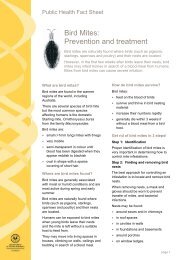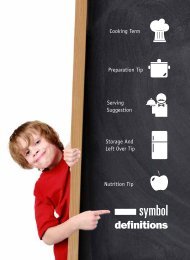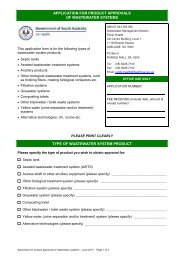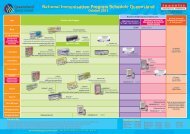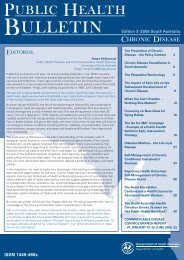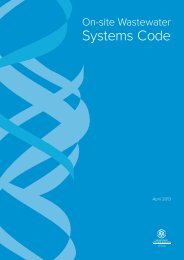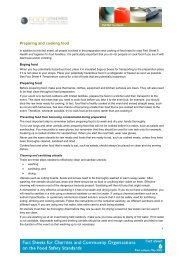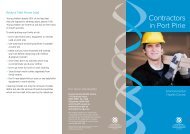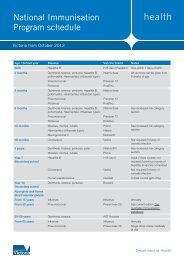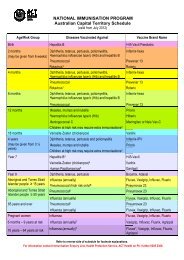Food Act Report 2009/2010 - SA Health - SA.Gov.au
Food Act Report 2009/2010 - SA Health - SA.Gov.au
Food Act Report 2009/2010 - SA Health - SA.Gov.au
You also want an ePaper? Increase the reach of your titles
YUMPU automatically turns print PDFs into web optimized ePapers that Google loves.
Appendix 3ResultsProduct TypeB. cereusPer gramStaphPer gramColiformsPer gramSalmonellaPer gramSPCPer gramStep 1 from birth < 100 < 10 < 3 ND 400Starter 1 < 100 < 10 < 3 ND 10Starter infant formula < 100 < 10 < 3 ND 10Suitable from birth < 100 < 10 < 3 ND 20From 6 months < 100 < 10 < 3 ND 100Suitable from birth < 100 < 10 < 3 ND 10Infant formula Stage 1 < 100 < 10 < 3 ND < 10For infants from birth < 100 < 10 < 3 ND < 10From Birth < 100 < 10 < 3 ND 50For babies at risk of allergy < 100 < 10 < 3 ND 10Goat – from birth < 100 < 10 < 3 ND 10Soy – all ages from birth < 100 < 10 < 3 ND 10Infant formula from birth < 100 < 10 < 3 ND < 10Newborn < 100 < 10 < 3 ND < 100Progress < 100 < 10 < 3 ND 80Newborn < 100 < 10 < 3 ND 10Progress < 100 < 10 < 3 ND 20Pre-term formula up to 12 months < 100 < 10 < 3 ND < 10For babies with reflux < 100 < 10 < 3 ND < 100For lactose intolerant babies < 100 < 10 < 3 ND 10Discussion of ResultsThe survey results indicated an exceptional level of compliance with Standard 1.6.1 of the Code. 100% of samplesanalysed returned microbiological results within the allowable level for powdered infant formulas.The survey indicated a moderate level of compliance with general labelling requirements as set out in Part 1.2 ofthe Code, with 70% of samples fully complying with requirements.The remaining 30% of samples were non-compliant with Standard 1.2.11 Country of Origin requirements ofthe Code.Follow up <strong>Act</strong>ivitiesA letter was sent to the NSW <strong>Food</strong> Authority, advising them of six labelling non-compliances in relation to failure toidentify the country of origin as required by Standard 1.2.11 of the Code. The matter is currently under investigation.ConclusionTwenty powdered infant formulas were analysed for Bacillus cereus, Coagulase-positive Staphylococci, Coliforms,Salmonella, and Standard Plate Count (SPC) and reviewed for general labelling compliance. The survey indicated anexceptional level of compliance with microbiological limits, and a moderate level of compliance with general labellingrequirements as set out in the Code.page 49<strong>Food</strong> <strong>Act</strong> <strong>Report</strong> Year ending 30 June <strong>2010</strong>



